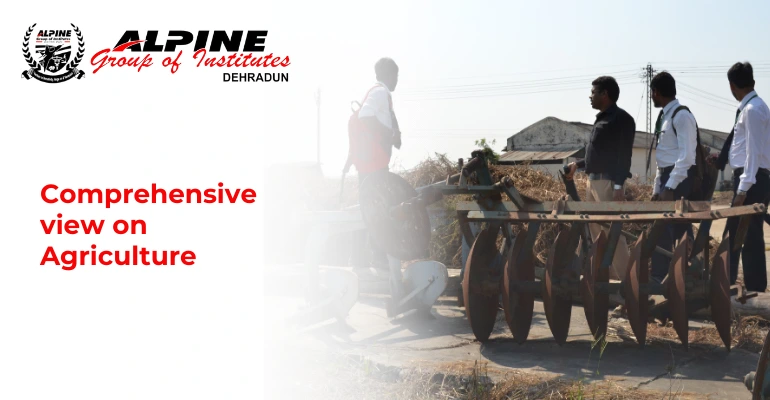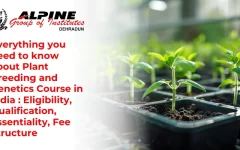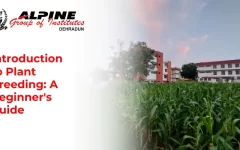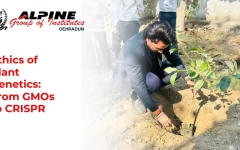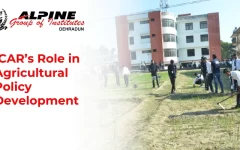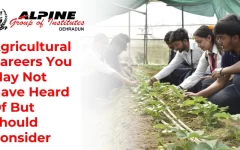Comprehensive view on Agriculture: As a leading Agriculturalist
2024-12-16 8:11Comprehensive view on Agriculture: As a leading Agriculturalist
Introduction To Agriculture Science
Agriculture is a course designed to offer students a specialized knowledge and skills in the Agriculture Technology, Dairy science, Plant Science, Horticulture, Soil Science, Plant Genetics and forestry. It involves exploring the various disciplines that contribute to Agricultural Science and practices.
An agriculture course will teach you how to utilise land and water resources in producing livestock, plants and crops . Agriculture courses are highly interdisciplinary, requiring students to have a good grasp of both natural sciences and social sciences. It brings together a wide range of disciplines including animal and land management, food science, economics, horticulture, technology, and environmental conservation.
Scope of Agriculture
The scope of an Agriculture course is broad and varied, encompassing numerous fields and opportunities. Agriculture scope in India is a vast owing to the country’s dependence on agriculture for its economy and employment.
1. Career Opportunities
- Agronomy – Focus on crop production and soil management.
- Horticulture – Specializing in the cultivation of fruits, Vegetables, and ornamental plants.
- Plant Genetics and breeding – Application of genetic principles to produce plants that are more useful to humans.
- Soil Science – Study of Soil, its components, its properties, etc. as a natural resource.
2. Research and Development
Opportunities in agricultural research institutions, focusing on crop improvement, pest management and sustainable practices.
3. Consultancy
Working with farmers and agricultural business to improve practices, increase yields and manage resources.
4. Agribusiness
Role in marketing, finance, etc.
5. Extension Services
Educating farmers about new technologies and policies by government.
6. Global opportunities
International work in developing countries, focusing on agriculture development and sustainable practices.
Essential Skills and Qualifications for Agriculturist
To become a successful agriculturist, several essential skills and qualifications are important:
Educational Background
Degree in Agriculture or Related Field: A bachelor’s degree in agriculture, horticulture, agronomy, or a related field is often required. Advanced degrees are beneficial for specialized roles.
Technical Skills
Knowledge of Agricultural Practices:
Understanding soil science, crop management, pest control, and sustainable farming techniques.
Data Analysis:
Ability to analyse agricultural data, including yield statistics, soil health metrics, and market trends.
Practical Skills
Field Experience:
Hands-on experience in farming or agricultural settings is crucial for understanding real-world applications.
Equipment Operation:
Familiarity with agricultural machinery and tools, including tractors, ploughs, and irrigation systems.
Certifications
Relevant certifications from recognizes boards and authorities
Licenses
Depending on the area of specialization, certain licenses such as Pesticide Application may be required.
Tools and Technology in Agriculture
Modern agriculture relies heavily on a variety of tools and technologies to improve efficiency, yield, and sustainability.
1.Precision Agriculture
- GPS Technology: Used for mapping fields and monitoring crop conditions.
- Drones: Employed for aerial surveys, crop monitoring, and precision spraying.
2. Soil and Crop Monitoring
- Soil Sensors: Measure moisture, nutrient levels, and pH to inform irrigation and fertilization.
- Remote Sensing: Satellite imagery and drones help assess crop health and soil conditions.
3. Irrigation Technology
- Drip Irrigation: Delivers water directly to plant roots, conserving water and reducing evaporation.
4. Hand Tools and Power Tools
Shovel, Hoe Pruning Shears, Cultivator, etc.
5. Maintenance and Management Software
- Systems for maintaining Agricultural record and Project Management.
- Staying well updated with the advancement and new technologies is crucial for an Agriculturist to effectively contribute to the agricultural sector and promote sustainable practices.
Challenges for an Agriculturist
Climate Variability:
Weather patterns can be unpredictable, affecting crop yields and livestock health. Droughts, floods, and extreme temperatures pose significant risks.
Pest and Disease Management:
Farmers must continuously battle pests and diseases that threaten crops and livestock, requiring knowledge of integrated pest management strategies.
Market Fluctuations:
Prices for agricultural products can be volatile, impacting profitability. Farmers need to navigate market trends and consumer demand.
Resource Management:
Efficiently managing water, soil, and other resources is crucial. Issues like soil degradation and water scarcity can hinder productivity.
Labour Shortages:
Finding skilled labour can be a challenge, especially during peak seasons. This can affect planting and harvesting schedules.
Regulatory Compliance:
Navigating agricultural regulations and policies can be complex and time-consuming, requiring knowledge of safety standards, environmental laws, and subsidies.
Technology Adoption:
While technology can enhance efficiency, the initial investment and learning curve can be barriers, particularly for small-scale farmers.
Conclusion
Agriculture sector is of vital importance in India. It is undergoing a process of transition to a market economy, with substantial changes in the social, legal, structural, productive and supply setups. This profession requires a combination of technical as well as practical knowledge in the field and good communication skills to interact with the farmers and make them understand and aware about the new policies and technologies of Agriculture.
Agriculture opens vast opportunities for the students in Government as well as Private sector. There are various jobs available such as Agriculture Officer, Horticulture Officer, Agriculture Officers in banks, Irrigation Department. Private manufacturer of pesticides, hybrid seeds, fertilizers, etc. require large number of determined professionals in this field.


